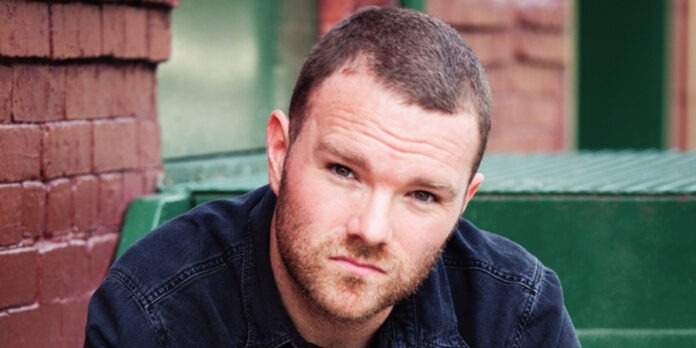MILTOWN Malbay based author, Darragh McKeon, was one of the highlights of this year’s Ennis Book Club Festival. Now based Clare, he grew up in Offaly and his debut novel All That Is Solid Melts Into Air was published in 2014 to international acclaim. It was translated into nine different languages, was a New York Times Editor’s Choice and in France it won the Lire Prize for Best International Debut.
His second novel Remembrance Sunday was published last year to further acclaim, with the Irish Times stating that the book’s “imaginative storytelling and fine prose of Remembrance Sunday puts McKeon in the big leagues.”
Born in 1979, he is just about old enough to have a vague memory of the IRA bombing of Enniskillen on Remembrance Sunday, 1987, which saw 12 deaths. It was one of the worst atrocities of the Troubles and saw an outcry across Ireland and the UK.
However when he first began work on what would become Remembrance Sunday he had no intention of writing about the horrific bombing in Enniskillen. “It was a process. I was living in New York, and half of the book is set there, in Chinatown. I really wanted to write about Chinatown and I was writing about an Irish character living there, he was from Fermanagh. I wrote a draft, only very briefing mentioning the Troubles, at one point I wrote a paragraph where he had a potential sighting of some IRA activity, then I moved on and finished the draft. In the second draft I kind of realised that first of all I was avoiding writing about the Troubles and that I needed to expand upon that one little snapshot.”
While the Enniskillen bombing is at the core of the book, it’s not just about those terrible events. “It’s called Remebrance Sunday and the bombing is a central event in it, but it’s also very much about memory, how we remember things and it’s also about consciousness, the lives that we’ve lived and how the past is not really the past, how things kind of move on and live in the present as well. It’s about a lot of things but the central event of the bombing is what holds it together.”
He is clearly fascinated by the nature of memory. “Part of the reason I wrote the book is that I volunteered in a hospice and I was spending time with people who were very close to death. It was very obvious that things that were very present for them were things that happened in their past. But you get to that kind of point in your life and suddenly that doesn’t feel past, it feels very, very present. The stuff that a lot of people went through in the North, you can call it generational trauma, they’re still living through it. We can put things down as past history and political history, but they’re still going through it on a feasible and psychological basis.”
He wanted to look at some very fundamental questions. “I was curious about why someone decides to bomb their own community. There’s a character that I work my way through and give very strong psychological reasons. But I’m also asking bigger questions about how do we remember, how does violence spread, how do we hate each other, how do we think about those things, and is consciousness something in our biology or is it something much bigger than that.”
On his research around that, he says, “I read a lot of neuroscience and I read a lot of stuff about consciousness. We really don’t know what consciousness is. One of the things I wanted to challenge a little bit was that we now talk about neuroscientists in the way we used to talk about archbishops, that they have this kind of infallible knowledge. But actually if you look at brain science, neurons are no different than any other cells in our body, and neuroscience really has no idea where consciousness comes from.”
He feels that fiction offers a chance to explore some of the most fundamental questions of existence. “The point of being a writer isn’t just about telling stories, it’s actually about asking who we are. The point of writing for me is to answer some of the deepest questions and part of the reason that people turn to books is to engage with those questions and the beauty of a novel is that it can do that through story. The really essential things in our lives are contained in novels.”
There was a need to be conscious of the pain caused by the bombing when he was writing. “I had a really deep obligation to not take advantage of the story, there are real victims and I felt an obligation to think very deeply about the event and not just parse it for a story that might sell books. But also to put myself in the position of people who are in Northern Ireland have been through it and are asking themselves 30 years later questions like why did that happen, how did we go through that and come out the other end and what’s the result of that.”
He spent an incredible eight years working on Remembrance Sunday. “My first book was about Chernobyl, it was quite a big book about the end of the Soviet Union and the Chernobyl accident. I was 25 when I started writing it, it was too large a book for me to take on but I eventually did pull it off. I suppose that was good training for me for this one, in that that one fell apart a few times and I went back to page one. That happened again with this one, but it wasn’t as intimidating because I had already been through that process.”
When he started he had initially hoped to write a distinct New York novel, but ended up with one rooted in modern Irish history.
Now living back in Ireland, he says he loves the corner of Clare that is his home. “I love it here. I think we’re very good at community here and that’s really valuable and it’s breaking down in other parts of the world. You almost have to go away to really appreciate how strong it is here.”
Owen Ryan has been a journalist with the Clare Champion since 2007, having previously worked with a number of other publications in Limerick, Cork and Galway. His first book will be published in December 2024.


